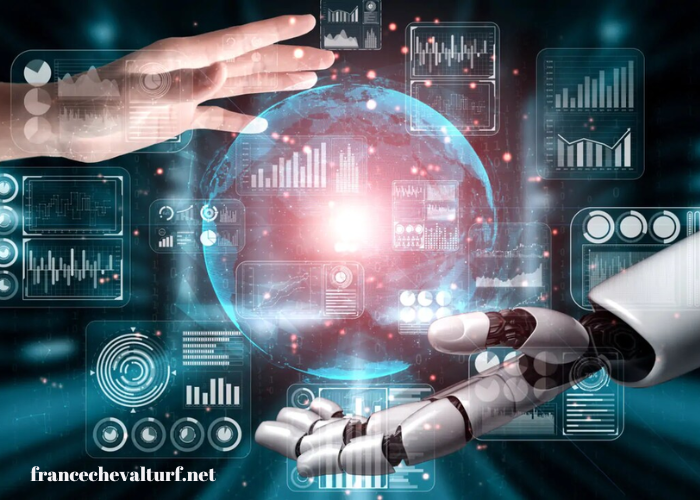In today’s rapidly evolving landscape, businesses are no longer competing on the basis of traditional metrics alone. The advent of technology has transformed every aspect of the business world, making it more dynamic, complex, and interconnected. Companies that adapt to these changes not only survive but thrive, often leading their industries. As we look toward the future, several innovative tech trends are poised to revolutionize the business sector, offering new opportunities and challenges.
Artificial Intelligence (AI) and Machine Learning (ML)
Artificial Intelligence (AI) and Machine Learning (ML) are arguably the most transformative technologies of the 21st century. They have already begun to reshape various industries, from healthcare to finance, and their influence on business operations is undeniable.
AI enables businesses to automate routine tasks, leading to significant cost savings and increased efficiency. For example, AI-powered chatbots provide customer service 24/7, resolving common queries without human intervention. Machine Learning, a subset of AI, allows systems to learn from data and improve over time without explicit programming. This ability to analyze vast amounts of data quickly and accurately enables businesses to make better decisions, predict market trends, and personalize customer experiences.
In the coming years, the integration of AI and ML in business will likely become even more sophisticated. Businesses that leverage these technologies effectively will be able to stay ahead of the competition by offering more personalized services, optimizing their supply chains, and predicting consumer behavior with unprecedented accuracy.
Blockchain Technology
Blockchain technology, initially developed as the underlying technology for cryptocurrencies like Bitcoin, has grown beyond its original purpose and is now being adopted across various sectors. At its core, blockchain is a decentralized digital ledger that records transactions across multiple computers securely and transparently.
In the business world, blockchain offers several benefits, including increased transparency, enhanced security, and reduced costs. For instance, in supply chain management, blockchain can be used to track products from their origin to the end consumer, ensuring authenticity and reducing the risk of fraud. In finance, blockchain facilitates faster and more secure transactions, reducing the need for intermediaries and lowering transaction costs.
Moreover, blockchain’s potential for creating smart contracts—self-executing contracts with the terms of the agreement directly written into code—could revolutionize legal agreements and business transactions. As businesses continue to explore blockchain’s possibilities, it is expected to become a critical component of future business operations.
Internet of Things (IoT)
The Internet of Things (IoT) refers to the interconnected network of physical devices, vehicles, appliances, and other items embedded with sensors, software, and connectivity. These devices can collect and exchange data, enabling businesses to gain insights and make data-driven decisions.
IoT is transforming industries by enabling smarter operations and enhancing customer experiences. For example, in manufacturing, IoT devices monitor equipment performance in real-time, predicting maintenance needs before breakdowns occur, thus reducing downtime and operational costs. In retail, IoT devices can track customer behavior, helping businesses personalize marketing efforts and optimize inventory management.
As IoT technology advances, its applications in business will continue to grow. Companies that adopt IoT solutions will gain a competitive edge by improving efficiency, reducing costs, and offering more personalized products and services.
5G Technology
The rollout of 5G technology is set to revolutionize the way businesses operate. With its ultra-fast speeds, low latency, and massive connectivity potential, 5G will enable new applications and services that were previously impossible with 4G.
For businesses, 5G opens up new possibilities for innovation. It will enhance the capabilities of IoT devices, enabling more devices to connect and communicate simultaneously. This will lead to smarter cities, more efficient supply chains, and enhanced customer experiences.
Moreover, 5G will play a crucial role in the development of augmented reality (AR) and virtual reality (VR) applications, enabling businesses to offer immersive experiences to customers and employees alike. For example, in retail, AR can be used to create virtual showrooms, while in education, VR can provide immersive training experiences.
As 5G networks continue to expand, businesses that adopt this technology early will be well-positioned to take advantage of its transformative potential.
Augmented Reality (AR) and Virtual Reality (VR)
Augmented Reality (AR) and Virtual Reality (VR) are no longer confined to the realm of gaming and entertainment. These technologies are increasingly being adopted by businesses to enhance customer experiences, improve training and collaboration, and streamline operations.
AR overlays digital information onto the physical world, offering businesses new ways to interact with customers and employees. For example, AR can be used in retail to create interactive shopping experiences, allowing customers to visualize products in their own space before making a purchase. In manufacturing, AR can assist workers by providing real-time information and guidance during complex tasks.
On the other hand, VR creates fully immersive digital environments, which can be used for training, simulation, and remote collaboration. In industries like healthcare, VR is used for medical training and simulation, allowing professionals to practice procedures in a risk-free environment. In corporate settings, VR enables virtual meetings and collaboration, reducing the need for physical travel and enhancing productivity.
As AR and VR technologies continue to evolve, their applications in business will expand, offering new ways to engage customers, improve training, and optimize operations.
Robotic Process Automation (RPA)
Robotic Process Automation (RPA) involves the use of software robots to automate repetitive, rule-based tasks. RPA is transforming business processes by increasing efficiency, reducing errors, and freeing up employees to focus on more strategic activities.
RPA is particularly beneficial in industries such as finance, healthcare, and logistics, where there are numerous repetitive tasks that can be automated. For example, in finance, RPA can automate processes like invoice processing, payroll management, and compliance reporting. In healthcare, RPA can be used to manage patient records, schedule appointments, and process insurance claims.
As RPA technology continues to advance, its capabilities will expand, enabling businesses to automate more complex tasks and processes. Companies that invest in RPA will be able to streamline operations, reduce costs, and improve overall efficiency.
Quantum Computing
Quantum computing is an emerging technology that promises to solve complex problems that are beyond the capabilities of classical computers. While still in its early stages, quantum computing has the potential to revolutionize industries such as finance, healthcare, and logistics.
In finance, quantum computing could be used to optimize trading strategies, manage risk, and enhance cybersecurity. In healthcare, quantum computers could accelerate drug discovery, improve diagnostics, and personalize treatment plans. In logistics, quantum computing could optimize supply chain management, reducing costs and improving efficiency.
As quantum computing technology matures, businesses that invest in this area will gain a significant competitive advantage, unlocking new opportunities and solving challenges that were previously insurmountable.
Sustainability and Green Technologies
Sustainability is becoming a key focus for businesses worldwide, driven by increasing environmental concerns and regulatory pressures. Green technologies, which aim to reduce environmental impact, are gaining traction across industries.
Businesses are adopting green technologies such as renewable energy, energy-efficient systems, and sustainable materials to reduce their carbon footprint and meet sustainability goals. For example, companies are investing in solar and wind energy to power their operations, implementing energy-efficient lighting and HVAC systems, and using sustainable packaging materials.
In addition to environmental benefits, sustainability initiatives can also lead to cost savings and enhance brand reputation. As consumers become more environmentally conscious, businesses that prioritize sustainability will be better positioned to attract and retain customers.
9. Cybersecurity
As businesses become more reliant on digital technologies, cybersecurity has become a critical concern. Cyberattacks are becoming more sophisticated and frequent, posing significant risks to businesses of all sizes.
To protect their operations, businesses must invest in robust cybersecurity measures. This includes implementing advanced encryption, multi-factor authentication, and regular security audits. Additionally, businesses must prioritize employee training to ensure that staff are aware of cybersecurity risks and best practices.
In the future, cybersecurity will continue to be a top priority for businesses, particularly as the number of connected devices and digital assets grows. Companies that invest in cybersecurity will be better equipped to protect their data, maintain customer trust, and avoid costly breaches.
Conclusion
The future of business is being shaped by a range of innovative tech trends that offer both opportunities and challenges. From AI and blockchain to IoT and quantum computing, these technologies are transforming the way businesses operate, enabling them to stay competitive in an increasingly digital world.
Businesses that embrace these trends will be well-positioned to thrive in the future, offering enhanced products and services, optimizing operations, and driving innovation. However, success will require not only technological investment but also a willingness to adapt and evolve in response to the changing business landscape. As we move forward, the companies that can harness the power of these technologies will lead the way in shaping the future of business.




